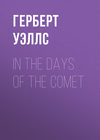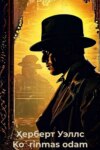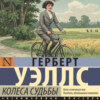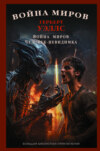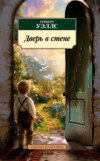Kitobni o'qish: «In the Days of the Comet»
PROLOGUE
THE MAN WHO WROTE IN THE TOWER
I SAW a gray-haired man, a figure of hale age, sitting at a desk and writing.
He seemed to be in a room in a tower, very high, so that through the tall window on his left one perceived only distances, a remote horizon of sea, a headland and that vague haze and glitter in the sunset that many miles away marks a city. All the appointments of this room were orderly and beautiful, and in some subtle quality, in this small difference and that, new to me and strange. They were in no fashion I could name, and the simple costume the man wore suggested neither period nor country. It might, I thought, be the Happy Future, or Utopia, or the Land of Simple Dreams; an errant mote of memory, Henry James's phrase and story of "The Great Good Place," twinkled across my mind, and passed and left no light.
The man I saw wrote with a thing like a fountain pen, a modern touch that prohibited any historical retrospection, and as he finished each sheet, writing in an easy flowing hand, he added it to a growing pile upon a graceful little table under the window. His last done sheets lay loose, partly covering others that were clipped together into fascicles.
Clearly he was unaware of my presence, and I stood waiting until his pen should come to a pause. Old as he certainly was he wrote with a steady hand..
I discovered that a concave speculum hung slantingly high over his head; a movement in this caught my attention sharply, and I looked up to see, distorted and made fantastic but bright and beautifully colored, the magnified, reflected, evasive rendering of a palace, of a terrace, of the vista of a great roadway with many people, people exaggerated, impossible-looking because of the curvature of the mirror, going to and fro. I turned my head quickly that I might see more clearly through the window behind me, but it was too high for me to survey this nearer scene directly, and after a momentary pause I came back to that distorting mirror again.
But now the writer was leaning back in his chair. He put down his pen and sighed the half resentful sigh – "ah! you, work, you! how you gratify and tire me!" – of a man who has been writing to his satisfaction.
"What is this place," I asked, "and who are you?"
He looked around with the quick movement of surprise.
"What is this place?" I repeated, "and where am I?"
He regarded me steadfastly for a moment under his wrinkled brows, and then his expression softened to a smile. He pointed to a chair beside the table. "I am writing," he said.
"About this?"
"About the change."
I sat down. It was a very comfortable chair, and well placed under the light.
"If you would like to read – " he said.
I indicated the manuscript. "This explains?" I asked.
"That explains," he answered.
He drew a fresh sheet of paper toward him as he looked at me.
I glanced from him about his apartment and back to the little table. A fascicle marked very distinctly "1" caught my attention, and I took it up. I smiled in his friendly eyes. "Very well," said I, suddenly at my ease, and he nodded and went on writing. And in a mood between confidence and curiosity, I began to read.
This is the story that happy, active-looking old man in that pleasant place had written.
BOOK THE FIRST
THE COMET
CHAPTER THE FIRST
DUST IN THE SHADOWS
Section 1
I HAVE set myself to write the story of the Great Change, so far as it has affected my own life and the lives of one or two people closely connected with me, primarily to please myself.
Long ago in my crude unhappy youth, I conceived the desire of writing a book. To scribble secretly and dream of authorship was one of my chief alleviations, and I read with a sympathetic envy every scrap I could get about the world of literature and the lives of literary people. It is something, even amidst this present happiness, to find leisure and opportunity to take up and partially realize these old and hopeless dreams. But that alone, in a world where so much of vivid and increasing interest presents itself to be done, even by an old man, would not, I think, suffice to set me at this desk. I find some such recapitulation of my past as this will involve, is becoming necessary to my own secure mental continuity. The passage of years brings a man at last to retrospection; at seventy-two one's youth is far more important than it was at forty. And I am out of touch with my youth. The old life seems so cut off from the new, so alien and so unreasonable, that at times I find it bordering upon the incredible. The data have gone, the buildings and places. I stopped dead the other afternoon in my walk across the moor, where once the dismal outskirts of Swathinglea straggled toward Leet, and asked, "Was it here indeed that I crouched among the weeds and refuse and broken crockery and loaded my revolver ready for murder? Did ever such a thing happen in my life? Was such a mood and thought and intention ever possible to me? Rather, has not some queer nightmare spirit out of dreamland slipped a pseudo-memory into the records of my vanished life?" There must be many alive still who have the same perplexities. And I think too that those who are now growing up to take our places in the great enterprise of mankind, will need many such narratives as mine for even the most partial conception of the old world of shadows that came before our day. It chances too that my case is fairly typical of the Change; I was caught midway in a gust of passion; and a curious accident put me for a time in the very nucleus of the new order.
My memory takes me back across the interval of fifty years to a little ill-lit room with a sash window open to a starry sky, and instantly there returns to me the characteristic smell of that room, the penetrating odor of an ill-trimmed lamp, burning cheap paraffin. Lighting by electricity had then been perfected for fifteen years, but still the larger portion of the world used these lamps. All this first scene will go, in my mind at least, to that olfactory accompaniment. That was the evening smell of the room. By day it had a more subtle aroma, a closeness, a peculiar sort of faint pungency that I associate – I know not why – with dust.
Let me describe this room to you in detail. It was perhaps eight feet by seven in area and rather higher than either of these dimensions; the ceiling was of plaster, cracked and bulging in places, gray with the soot of the lamp, and in one place discolored by a system of yellow and olive-green stains caused by the percolation of damp from above. The walls were covered with dun-colored paper, upon which had been printed in oblique reiteration a crimson shape, something of the nature of a curly ostrich feather, or an acanthus flower, that had in its less faded moments a sort of dingy gaiety. There were several big plaster-rimmed wounds in this, caused by Parload's ineffectual attempts to get nails into the wall, whereby there might hang pictures. One nail had hit between two bricks and got home, and from this depended, sustained a little insecurely by frayed and knotted blind-cord, Parload's hanging bookshelves, planks painted over with a treacly blue enamel and further decorated by a fringe of pinked American cloth insecurely fixed by tacks. Below this was a little table that behaved with a mulish vindictiveness to any knee that was thrust beneath it suddenly; it was covered with a cloth whose pattern of red and black had been rendered less monotonous by the accidents of Parload's versatile ink bottle, and on it, leit motif of the whole, stood and stank the lamp. This lamp, you must understand, was of some whitish translucent substance that was neither china nor glass, it had a shade of the same substance, a shade that did not protect the eyes of a reader in any measure, and it seemed admirably adapted to bring into pitiless prominence the fact that, after the lamp's trimming, dust and paraffin had been smeared over its exterior with a reckless generosity.
The uneven floor boards of this apartment were covered with scratched enamel of chocolate hue, on which a small island of frayed carpet dimly blossomed in the dust and shadows.
There was a very small grate, made of cast-iron in one piece and painted buff, and a still smaller misfit of a cast-iron fender that confessed the gray stone of the hearth. No fire was laid, only a few scraps of torn paper and the bowl of a broken corn-cob pipe were visible behind the bars, and in the corner and rather thrust away was an angular japanned coal-box with a damaged hinge. It was the custom in those days to warm every room separately from a separate fireplace, more prolific of dirt than heat, and the rickety sash window, the small chimney, and the loose-fitting door were expected to organize the ventilation of the room among themselves without any further direction.
Parload's truckle bed hid its gray sheets beneath an old patchwork counterpane on one side of the room, and veiled his boxes and suchlike oddments, and invading the two corners of the window were an old whatnot and the washhandstand, on which were distributed the simple appliances of his toilet.
This washhandstand had been made of deal by some one with an excess of turnery appliances in a hurry, who had tried to distract attention from the rough economies of his workmanship by an arresting ornamentation of blobs and bulbs upon the joints and legs. Apparently the piece had then been placed in the hands of some person of infinite leisure equipped with a pot of ocherous paint, varnish, and a set of flexible combs. This person had first painted the article, then, I fancy, smeared it with varnish, and then sat down to work with the combs to streak and comb the varnish into a weird imitation of the grain of some nightmare timber. The washhandstand so made had evidently had a prolonged career of violent use, had been chipped, kicked, splintered, punched, stained, scorched, hammered, dessicated, damped, and defiled, had met indeed with almost every possible adventure except a conflagration or a scrubbing, until at last it had come to this high refuge of Parload's attic to sustain the simple requirements of Parload's personal cleanliness. There were, in chief, a basin and a jug of water and a slop-pail of tin, and, further, a piece of yellow soap in a tray, a tooth-brush, a rat-tailed shaving brush, one huckaback towel, and one or two other minor articles. In those days only very prosperous people had more than such an equipage, and it is to be remarked that every drop of water Parload used had to be carried by an unfortunate servant girl, – the "slavey," Parload called her – up from the basement to the top of the house and subsequently down again. Already we begin to forget how modern an invention is personal cleanliness. It is a fact that Parload had never stripped for a swim in his life; never had a simultaneous bath all over his body since his childhood. Not one in fifty of us did in the days of which I am telling you.
A chest, also singularly grained and streaked, of two large and two small drawers, held Parload's reserve of garments, and pegs on the door carried his two hats and completed this inventory of a "bed-sitting-room" as I knew it before the Change. But I had forgotten – there was also a chair with a "squab" that apologized inadequately for the defects of its cane seat. I forgot that for the moment because I was sitting on the chair on the occasion that best begins this story.
I have described Parload's room with such particularity because it will help you to understand the key in which my earlier chapters are written, but you must not imagine that this singular equipment or the smell of the lamp engaged my attention at that time to the slightest degree. I took all this grimy unpleasantness as if it were the most natural and proper setting for existence imaginable. It was the world as I knew it. My mind was entirely occupied then by graver and intenser matters, and it is only now in the distant retrospect that I see these details of environment as being remarkable, as significant, as indeed obviously the outward visible manifestations of the old world disorder in our hearts.
Section 2
Parload stood at the open window, opera-glass in hand, and sought and found and was uncertain about and lost again, the new comet.
I thought the comet no more than a nuisance then because I wanted to talk of other matters. But Parload was full of it. My head was hot, I was feverish with interlacing annoyances and bitterness, I wanted to open my heart to him – at least I wanted to relieve my heart by some romantic rendering of my troubles – and I gave but little heed to the things he told me. It was the first time I had heard of this new speck among the countless specks of heaven, and I did not care if I never heard of the thing again.
We were two youths much of an age together, Parload was two and twenty, and eight months older than I. He was – I think his proper definition was "engrossing clerk" to a little solicitor in Overcastle, while I was third in the office staff of Rawdon's pot-bank in Clayton. We had met first in the "Parliament" of the Young Men's Christian Association of Swathinglea; we had found we attended simultaneous classes in Overcastle, he in science and I in shorthand, and had started a practice of walking home together, and so our friendship came into being. (Swathinglea, Clayton, and Overcastle were contiguous towns, I should mention, in the great industrial area of the Midlands.) We had shared each other's secret of religious doubt, we had confided to one another a common interest in Socialism, he had come twice to supper at my mother's on a Sunday night, and I was free of his apartment. He was then a tall, flaxen-haired, gawky youth, with a disproportionate development of neck and wrist, and capable of vast enthusiasm; he gave two evenings a week to the evening classes of the organized science school in Overcastle, physiography was his favorite "subject," and through this insidious opening of his mind the wonder of outer space had come to take possession of his soul. He had commandeered an old opera-glass from his uncle who farmed at Leet over the moors, he had bought a cheap paper planisphere and Whitaker's Almanac, and for a time day and moonlight were mere blank interruptions to the one satisfactory reality in his life – star-gazing. It was the deeps that had seized him, the immensities, and the mysterious possibilities that might float unlit in that unplumbed abyss. With infinite labor and the help of a very precise article in The Heavens, a little monthly magazine that catered for those who were under this obsession, he had at last got his opera-glass upon the new visitor to our system from outer space. He gazed in a sort of rapture upon that quivering little smudge of light among the shining pin-points – and gazed. My troubles had to wait for him.
"Wonderful," he sighed, and then as though his first emphasis did not satisfy him, "wonderful!"
He turned to me. "Wouldn't you like to see?"
I had to look, and then I had to listen, how that this scarce-visible intruder was to be, was presently to be, one of the largest comets this world has ever seen, how that its course must bring it within at most – so many score of millions of miles from the earth, a mere step, Parload seemed to think that; how that the spectroscope was already sounding its chemical secrets, perplexed by the unprecedented band in the green, how it was even now being photographed in the very act of unwinding – in an unusual direction – a sunward tail (which presently it wound up again), and all the while in a sort of undertow I was thinking first of Nettie Stuart and the letter she had just written me, and then of old Rawdon's detestable face as I had seen it that afternoon. Now I planned answers to Nettie and now belated repartees to my employer, and then again "Nettie" was blazing all across the background of my thoughts..
Nettie Stuart was daughter of the head gardener of the rich Mr. Verrall's widow, and she and I had kissed and become sweethearts before we were eighteen years old. My mother and hers were second cousins and old schoolfellows, and though my mother had been widowed untimely by a train accident, and had been reduced to letting lodgings (she was the Clayton curate's landlady), a position esteemed much lower than that of Mrs. Stuart, a kindly custom of occasional visits to the gardener's cottage at Checkshill Towers still kept the friends in touch. Commonly I went with her. And I remember it was in the dusk of one bright evening in July, one of those long golden evenings that do not so much give way to night as admit at last, upon courtesy, the moon and a choice retinue of stars, that Nettie and I, at the pond of goldfish where the yew-bordered walks converged, made our shy beginners' vow. I remember still – something will always stir in me at that memory – the tremulous emotion of that adventure. Nettie was dressed in white, her hair went off in waves of soft darkness from above her dark shining eyes; there was a little necklace of pearls about her sweetly modeled neck, and a little coin of gold that nestled in her throat. I kissed her half-reluctant lips, and for three years of my life thereafter – nay! I almost think for all the rest of her life and mine – I could have died for her sake.
You must understand – and every year it becomes increasingly difficult to understand – how entirely different the world was then from what it is now. It was a dark world; it was full of preventable disorder, preventable diseases, and preventable pain, of harshness and stupid unpremeditated cruelties; but yet, it may be even by virtue of the general darkness, there were moments of a rare and evanescent beauty that seem no longer possible in my experience. The great Change has come for ever more, happiness and beauty are our atmosphere, there is peace on earth and good will to all men. None would dare to dream of returning to the sorrows of the former time, and yet that misery was pierced, ever and again its gray curtain was stabbed through and through by joys of an intensity, by perceptions of a keenness that it seems to me are now altogether gone out of life. Is it the Change, I wonder, that has robbed life of its extremes, or is it perhaps only this, that youth has left me – even the strength of middle years leaves me now – and taken its despairs and raptures, leaving me judgment, perhaps, sympathy, memories?
I cannot tell. One would need to be young now and to have been young then as well, to decide that impossible problem.
Perhaps a cool observer even in the old days would have found little beauty in our grouping. I have our two photographs at hand in this bureau as I write, and they show me a gawky youth in ill-fitting ready-made clothing, and Nettie – Indeed Nettie is badly dressed, and her attitude is more than a little stiff; but I can see her through the picture, and her living brightness and something of that mystery of charm she had for me, comes back again to my mind. Her face has triumphed over the photographer – or I would long ago have cast this picture away.
The reality of beauty yields itself to no words. I wish that I had the sister art and could draw in my margin something that escapes description. There was a sort of gravity in her eyes. There was something, a matter of the minutest difference, about her upper lip so that her mouth closed sweetly and broke very sweetly to a smile. That grave, sweet smile!
After we had kissed and decided not to tell our parents for awhile of the irrevocable choice we had made, the time came for us to part, shyly and before others, and I and my mother went off back across the moonlit park – the bracken thickets rustling with startled deer – to the railway station at Checkshill and so to our dingy basement in Clayton, and I saw no more of Nettie – except that I saw her in my thoughts – for nearly a year. But at our next meeting it was decided that we must correspond, and this we did with much elaboration of secrecy, for Nettie would have no one at home, not even her only sister, know of her attachment. So I had to send my precious documents sealed and under cover by way of a confidential schoolfellow of hers who lived near London… I could write that address down now, though house and street and suburb have gone beyond any man's tracing.
Our correspondence began our estrangement, because for the first time we came into more than sensuous contact and our minds sought expression.
Now you must understand that the world of thought in those days was in the strangest condition, it was choked with obsolete inadequate formulae, it was tortuous to a maze-like degree with secondary contrivances and adaptations, suppressions, conventions, and subterfuges. Base immediacies fouled the truth on every man's lips. I was brought up by my mother in a quaint old-fashioned narrow faith in certain religious formulae, certain rules of conduct, certain conceptions of social and political order, that had no more relevance to the realities and needs of everyday contemporary life than if they were clean linen that had been put away with lavender in a drawer. Indeed, her religion did actually smell of lavender; on Sundays she put away all the things of reality, the garments and even the furnishings of everyday, hid her hands, that were gnarled and sometimes chapped with scrubbing, in black, carefully mended gloves, assumed her old black silk dress and bonnet and took me, unnaturally clean and sweet also, to church. There we sang and bowed and heard sonorous prayers and joined in sonorous responses, and rose with a congregational sigh refreshed and relieved when the doxology, with its opening "Now to God the Father, God the Son," bowed out the tame, brief sermon. There was a hell in that religion of my mother's, a red-haired hell of curly flames that had once been very terrible; there was a devil, who was also ex officio the British King's enemy, and much denunciation of the wicked lusts of the flesh; we were expected to believe that most of our poor unhappy world was to atone for its muddle and trouble here by suffering exquisite torments for ever after, world without end, Amen. But indeed those curly flames looked rather jolly. The whole thing had been mellowed and faded into a gentle unreality long before my time; if it had much terror even in my childhood I have forgotten it, it was not so terrible as the giant who was killed by the Beanstalk, and I see it all now as a setting for my poor old mother's worn and grimy face, and almost lovingly as a part of her. And Mr. Gabbitas, our plump little lodger, strangely transformed in his vestments and lifting his voice manfully to the quality of those Elizabethan prayers, seemed, I think, to give her a special and peculiar interest with God. She radiated her own tremulous gentleness upon Him, and redeemed Him from all the implications of vindictive theologians; she was in truth, had I but perceived it, the effectual answer to all she would have taught me.
So I see it now, but there is something harsh in the earnest intensity of youth, and having at first taken all these things quite seriously, the fiery hell and God's vindictiveness at any neglect, as though they were as much a matter of fact as Bladden's iron-works and Rawdon's pot-bank, I presently with an equal seriousness flung them out of my mind again.
Mr. Gabbitas, you see, did sometimes, as the phrase went, "take notice" of me, he had induced me to go on reading after I left school, and with the best intentions in the world and to anticipate the poison of the times, he had lent me Burble's "Scepticism Answered," and drawn my attention to the library of the Institute in Clayton.
The excellent Burble was a great shock to me. It seemed clear from his answers to the sceptic that the case for doctrinal orthodoxy and all that faded and by no means awful hereafter, which I had hitherto accepted as I accepted the sun, was an extremely poor one, and to hammer home that idea the first book I got from the Institute happened to be an American edition of the collected works of Shelley, his gassy prose as well as his atmospheric verse. I was soon ripe for blatant unbelief. And at the Young Men's Christian Association I presently made the acquaintance of Parload, who told me, under promises of the most sinister secrecy, that he was "a Socialist out and out." He lent me several copies of a periodical with the clamant title of The Clarion, which was just taking up a crusade against the accepted religion. The adolescent years of any fairly intelligent youth lie open, and will always lie healthily open, to the contagion of philosophical doubts, of scorns and new ideas, and I will confess I had the fever of that phase badly. Doubt, I say, but it was not so much doubt – which is a complex thing – as startled emphatic denial. "Have I believed THIS!" And I was also, you must remember, just beginning love-letters to Nettie.
We live now in these days, when the Great Change has been in most things accomplished, in a time when every one is being educated to a sort of intellectual gentleness, a gentleness that abates nothing from our vigor, and it is hard to understand the stifled and struggling manner in which my generation of common young men did its thinking. To think at all about certain questions was an act of rebellion that set one oscillating between the furtive and the defiant. People begin to find Shelley – for all his melody – noisy and ill conditioned now because his Anarchs have vanished, yet there was a time when novel thought HAD to go to that tune of breaking glass. It becomes a little difficult to imagine the yeasty state of mind, the disposition to shout and say, "Yah!" at constituted authority, to sustain a persistent note of provocation such as we raw youngsters displayed. I began to read with avidity such writing as Carlyle, Browning, and Heine have left for the perplexity of posterity, and not only to read and admire but to imitate. My letters to Nettie, after one or two genuinely intended displays of perfervid tenderness, broke out toward theology, sociology, and the cosmos in turgid and startling expressions. No doubt they puzzled her extremely.
I retain the keenest sympathy and something inexplicably near to envy for my own departed youth, but I should find it difficult to maintain my case against any one who would condemn me altogether as having been a very silly, posturing, emotional hobbledehoy indeed and quite like my faded photograph. And when I try to recall what exactly must have been the quality and tenor of my more sustained efforts to write memorably to my sweetheart, I confess I shiver.. Yet I wish they were not all destroyed.
Her letters to me were simple enough, written in a roundish, unformed hand and badly phrased. Her first two or three showed a shy pleasure in the use of the word "dear," and I remember being first puzzled and then, when I understood, delighted, because she had written "Willie ASTHORE" under my name. "Asthore," I gathered, meant "darling." But when the evidences of my fermentation began, her answers were less happy.
I will not weary you with the story of how we quarreled in our silly youthful way, and how I went the next Sunday, all uninvited, to Checkshill, and made it worse, and how afterward I wrote a letter that she thought was "lovely," and mended the matter. Nor will I tell of all our subsequent fluctuations of misunderstanding. Always I was the offender and the final penitent until this last trouble that was now beginning; and in between we had some tender near moments, and I loved her very greatly. There was this misfortune in the business, that in the darkness, and alone, I thought with great intensity of her, of her eyes, of her touch, of her sweet and delightful presence, but when I sat down to write I thought of Shelley and Burns and myself, and other such irrelevant matters. When one is in love, in this fermenting way, it is harder to make love than it is when one does not love at all. And as for Nettie, she loved, I know, not me but those gentle mysteries. It was not my voice should rouse her dreams to passion.. So our letters continued to jar. Then suddenly she wrote me one doubting whether she could ever care for any one who was a Socialist and did not believe in Church, and then hard upon it came another note with unexpected novelties of phrasing. She thought we were not suited to each other, we differed so in tastes and ideas, she had long thought of releasing me from our engagement. In fact, though I really did not apprehend it fully at the first shock, I was dismissed. Her letter had reached me when I came home after old Rawdon's none too civil refusal to raise my wages. On this particular evening of which I write, therefore, I was in a state of feverish adjustment to two new and amazing, two nearly overwhelming facts, that I was neither indispensable to Nettie nor at Rawdon's. And to talk of comets!
Where did I stand?
I had grown so accustomed to think of Nettie as inseparably mine – the whole tradition of "true love" pointed me to that – that for her to face about with these precise small phrases toward abandonment, after we had kissed and whispered and come so close in the little adventurous familiarities of the young, shocked me profoundly. I! I! And Rawdon didn't find me indispensable either. I felt I was suddenly repudiated by the universe and threatened with effacement, that in some positive and emphatic way I must at once assert myself. There was no balm in the religion I had learnt, or in the irreligion I had adopted, for wounded self-love.
Should I fling up Rawdon's place at once and then in some extraordinary, swift manner make the fortune of Frobisher's adjacent and closely competitive pot-bank?
The first part of that program, at any rate, would be easy of accomplishment, to go to Rawdon and say, "You will hear from me again," but for the rest, Frobisher might fail me. That, however, was a secondary issue. The predominant affair was with Nettie. I found my mind thick-shot with flying fragments of rhetoric that might be of service in the letter I would write her. Scorn, irony, tenderness – what was it to be?
